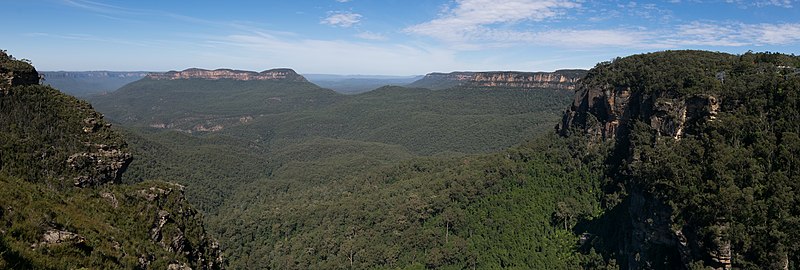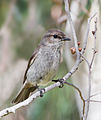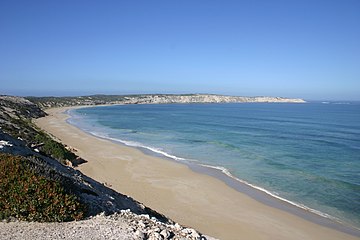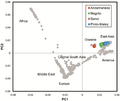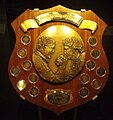Portal:Australia
| Showcase | Content | Interesting facts | Contributing |
Introduction

Australia, officially the Commonwealth of Australia, is a country comprising the mainland of the Australian continent, the island of Tasmania and numerous smaller islands. Australia has a total area of 7,688,287 km2 (2,968,464 sq mi), making it the sixth-largest country in the world and the largest country by area in Oceania. It is the world's oldest, flattest, and driest inhabited continent, with some of the least fertile soils. It is a megadiverse country, and its size gives it a wide variety of landscapes and climates including deserts in the interior and tropical rainforests along the coast.
The ancestors of Aboriginal Australians began arriving from south-east Asia 50,000 to 65,000 years ago, during the last glacial period. They settled on the continent and formed approximately 250 distinct language groups by the time of European settlement, maintaining some of the longest known continuing artistic and religious traditions in the world. Australia's written history commenced with Dutch exploration of most of the coastline in the 17th-century. British colonisation began in 1788 with the establishment of the penal colony of New South Wales. By the mid-19th century, most of the continent had been explored by European settlers and five additional self-governing British colonies were established, each gaining responsible government by 1890. The colonies federated in 1901, forming the Commonwealth of Australia. This continued a process of increasing autonomy from the United Kingdom, highlighted by the Statute of Westminster Adoption Act 1942, and culminating in the Australia Acts of 1986.
Australia is a federal parliamentary democracy and constitutional monarchy comprising six states and ten territories. Its population of more than 28 million is highly urbanised and heavily concentrated on the eastern seaboard. Canberra is the nation's capital, while its most populous cities are Sydney and Melbourne, both with a population of more than 5 million. Australia's culture is diverse, and the country has one of the highest foreign-born populations in the world. It has a highly developed market economy and one of the highest per capita incomes globally. Its abundant natural resources and well-developed international trade relations are crucial to the country's economy. It ranks highly for quality of life, health, education, economic freedom, civil liberties and political rights.
Featured article -

Persoonia lanceolata, commonly known as lance-leaf geebung, is a shrub native to New South Wales in eastern Australia. It reaches 3 m (10 ft) in height and has smooth grey bark and bright green foliage. Its small yellow flowers grow on racemes and appear in the austral summer and autumn (January to April), followed by green fleshy fruits (known as drupes) which ripen the following spring (September to October). Within the genus Persoonia, P. lanceolata belongs to the lanceolata group of 58 closely related species. It interbreeds with several other species found in its range. (Full article...)
Selected biography -

Clare Grant Stevenson, AM, MBE (18 July 1903 – 22 October 1988) was the inaugural Director of the Women's Auxiliary Australian Air Force (WAAAF), from May 1941 to March 1946. As such, she was described in 2001 as "the most significant woman in the history of the Air Force". Formed as a branch of the Royal Australian Air Force (RAAF) in March 1941, the WAAAF was the first and largest uniformed women's service in Australia during World War II, numbering more than 18,000 members by late 1944 and making up over thirty per cent of RAAF ground staff. (Full article...)
Did you know (auto-generated) -
- ... that pumices erupted by the Protector Shoal volcano in 1962 floated to Australia and South America?
- ... that Gil Kim played professional baseball in the Netherlands, China, Australia, Spain, and Venezuela, scouted in Mexico and the Dominican Republic, and coaches in Canada?
- ... that Jack Critchley, state parliamentarian then senator for South Australia, was invalided home from the Western Front with "wry neck"?
- ... that the Australian spider Progradungula barringtonensis has been called a "ghost of Gondwana"?
- ... that George Jenkins was described in 1901 as "the happiest, proudest, most important and most worried individual" in Australia, but 90 years later as "a lazy, dictatorial, unctuous opportunist"?
- ... that although the Eurovision Song Contest 2020 was cancelled, Iceland's planned entry for that year was chosen as the alternative winner in several countries, including Sweden and Australia?
- ... that Eva Duldig, who was interned by Australia during the Second World War, later represented the country at the Wimbledon Championships?
- ... that an exhibition match of Australian rules football was contested in London on 28 October 1916 between two teams of elite footballers also serving in the First AIF?
In the news
- 30 September 2024 – Australia–Tuvalu relations, Climate change in Tuvalu
- Tuvalu's climate minister denounces the Australian Labor government's decision to expand three coal mines as an existential threat to the nation, due to the role of the mines in causing rising sea levels that have forced mass displacement across Tuvalu's low-lying islands. (The Guardian)
- 28 September 2024 – 2024 AFL premiership season
- The Brisbane Lions defeat the Sydney Swans 120–60 in the Australian Football League Grand Final to win their fourth AFL premiership title. (The Guardian Australia)
- 26 September 2024 – Israel–Hezbollah conflict
- Israel rejects proposals from the United States, Australia, and the European Union to initiate a temporary 21-day ceasefire with Hezbollah. (Reuters) (Reuters 2)
- 23 September 2024 – 2024 AFL season
- In Australian football, Patrick Cripps wins his second Brownlow Medal with 45 votes, the most votes since the current voting system was introduced, and also becomes the seventeenth player to win the award more than once. (ABC News Australia)
- 18 September 2024 –
- Alleged Ghost developer and administrator Jay Je Yoon Jung is arrested in Sydney, Australia, on five charges related to the encrypted communication network's development and operation. (The Register)
Selected pictures -
On this day

- 1860 – The Victorian College for the Deaf is opened in a small house in Peel Street, Windsor.
- 1919 – Keith and Ross Macpherson Smith set out to fly a Vickers Vimy, G-EAOU, from England to Australia, the first flight between these two places. They arrive in Darwin on December 18.
- 1943 – Japanese planes make their last air raid on Darwin.
- 1971 – The Seven Mile Beach National Park is established 110 km southwest of Sydney.
General images
Topics
More portals
WikiProject
 |
 |
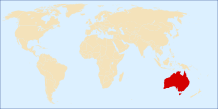
| |
Consider joining WikiProject Australia, a WikiProject dedicated to improving Wikipedia's coverage of topics related to Australia. The project page and its subpages contain suggestions on formatting and style of articles, which can be discussed at the project's notice board. To participate, simply add your name to the project members page.
As of 11 November 2024, there are 205,573 articles within the scope of WikiProject Australia, of which 594 are featured and 885 are good articles. This makes up 2.98% of the articles on Wikipedia, 5.34% of all featured articles and lists, and 2.18% of all good articles (see WP:AUSFG). Including non-article pages, such as talk pages, redirects, categories, etc., there are 526,066 pages in the project.
Associated Wikimedia
The following Wikimedia Foundation sister projects provide more on this subject:
-
Commons
Free media repository -
Wikibooks
Free textbooks and manuals -
Wikidata
Free knowledge base -
Wikinews
Free-content news -
Wikiquote
Collection of quotations -
Wikisource
Free-content library -
Wikiversity
Free learning tools -
Wikivoyage
Free travel guide -
Wiktionary
Dictionary and thesaurus

